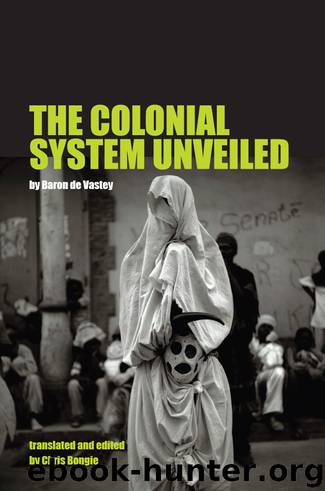The Colonial System Unveiled by de Vastey Baron; Bongie Chris;

Author:de Vastey, Baron; Bongie, Chris;
Language: eng
Format: epub
Publisher: Liverpool University Press
SUPPLEMENTARY ESSAYS
1
Monstrous Testimony: Baron de Vastey and the Politics of Black Memory
Marlene Daut
In January 1821, only months after the death of King Henry Christophe and the reunification of Haiti under President Jean-Pierre Boyer, Caleb Cushing provided a lengthy, much reprinted and referenced article in the North American Review that enthusiastically surveyed a number of publications from Haiti, including several by one of Christophe’s own secretaries, Baron de Vastey.1 The goal of placing these works from Haiti before his readers, the future US Attorney General wrote, was to highlight the ‘intrinsic merit’ of a body of literature, ‘written by the descendants of negroes’, that could provide ‘some means of judging of the intellectual dignity, which a population of blacks may hope to reach, in the most favourable circumstances’ (C. Cushing, 112). Drawing on a vocabulary of ‘regeneration’ that dates back to the eighteenth century, Cushing zeroed in on the writings of Vastey as ‘very favourable specimens of the native mental force of a Haytian’ (112): ‘wrought into the[ir] style’, he enthused, are ‘the vehemence of a once oppressed, but now victorious soldier, the fire of an emancipated slave, the vigorous pride of a regenerate African’, all of which ‘amply atone for their few trifling defects in arrangement and composition’ (114).
Cushing’s description of Vastey as a ‘regenerate African’ plays down his earlier uncertainty about the meaning of Vastey’s mixed racial identity. In a footnote that follows Cushing’s first mention of Vastey’s ‘colour’, the author owns that he is not sure of Vastey’s exact racial status, describing him as ‘a yellow man, either a mulatto or mestizo; it has not been in our power to ascertain which’ (113). He is quick to add that while Vastey’s ‘colour gave him some little advantage over pure blacks during the continuance of the colonial government’, it was but a ‘brief and slight’ one, and therefore ‘we may consider him as a person who has escaped from the lowest moral and intellectual degradation, by the force of his own powers and in opposition to the whole strength of unpropitious circumstances’ (113–14). Cushing’s later and continuous emphasis on Vastey as an ‘African’ or a ‘negro’ whose accomplishments should not be tied to any ‘advantage’ in connection with his lighter skin colour anxiously attempts to connect the works of Vastey (who was phenotypically white, according to some contemporary observers) to a singular genealogy of blackness rather than to a more complicated one that includes whiteness. Like many others who reviewed Vastey’s works in the early nineteenth-century Atlantic World, Cushing appears to have found the idea that Vastey was a ‘self-educated’ African (112) immediately functional because of the celebratory tale he could construct about Haitians’ capacities for literacy, learning, and, in short, ‘civilization’: a tale about ‘the regeneration of Hayti’ (129) that depended upon a refutation of ‘mulatto exceptionalism’ or ‘the idea that blacks displayed admirable traits because of their “Anglo-Saxon [or, more broadly, European] blood”’ (Gilmore, 59–60). In other words, Cushing’s ambivalence about the implications of whiteness in broader
Download
This site does not store any files on its server. We only index and link to content provided by other sites. Please contact the content providers to delete copyright contents if any and email us, we'll remove relevant links or contents immediately.
| Africa | Americas |
| Arctic & Antarctica | Asia |
| Australia & Oceania | Europe |
| Middle East | Russia |
| United States | World |
| Ancient Civilizations | Military |
| Historical Study & Educational Resources |
Pirate Hunter of the Caribbean by David Cordingly(650)
Architecture and Empire in Jamaica by Nelson Louis P(452)
Haitian Connections in the Atlantic World: Recognition After Revolution by Julia Gaffield(437)
Churchill Comes of Age by Hal Klepak(425)
THE HISTORY OF MARY PRINCE, A WEST INDIAN SLAVE by Mary Prince(417)
The Real Pirates of the Caribbean by Colin Woodard(360)
Sugar in the Blood: A Family's Story of Slavery and Empire by Andrea Stuart(352)
Tacky’s Revolt by Vincent Brown(352)
Trinidad's Doctor's Office by Vincent Tothill(344)
Bahamas Bucket List for Divers: Bimini Edition by Nathan Riley(339)
The Spirits and the Law: Vodou and Power in Haiti by Kate Ramsey(327)
The Cayman Islands in Transition: The Politics, History and Sociology of a Changing Society by J.A. Roy Bodden(319)
The Cry of Vertières by Jean-Pierre Le Glaunec(289)
Policing Life and Death by LeBron Marisol;(286)
An Eye For The Tropics: Tourism, Photography, and Framing the Caribbean Picturesque by Krista A. Thompson(277)
Caribbean History by Tony Martin(265)
The New Rum by Bryce T. Bauer(259)
A Brave Vessel: The True Tale of the Castaways Who Rescued Jamestown by Woodward Hobson(256)
A Contemporary Cuba Reader by Brenner Philip; Jiménez Marguerite Rose; Kirk John M(245)
